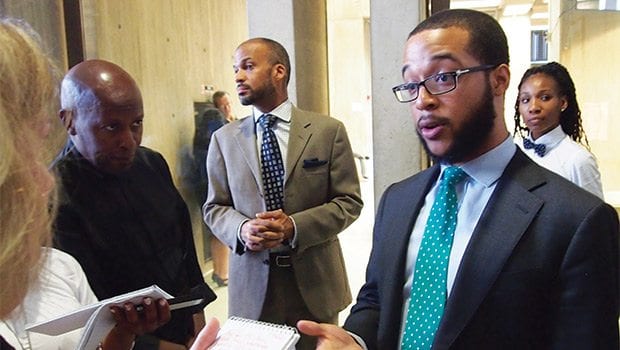Public may weigh in on police body camera pilot
Community meetings planned

The chance for broad community feedback on the Boston Police Department’s upcoming body camera pilot program may finally arrive, with three public meetings scheduled for late April. Community engagement has been long sought by members of the Boston Police Camera Action Team, an organization that formed to advocate for body cameras and policies governing their use.
Last August, BPCAT presented a proposed camera usage policy to the city council. The policy was developed in partnership with groups such as the American Civil Liberties Union, and BPCAT members say it received widespread community approval. The BPD has not taken up BPCAT’s policy, but rather, since announcing intentions for a pilot program last September, has been developing its own internally. Bringing voices from outside the police force into this process is a Social Justice Task Force. The task force comprises six police command staff members and 17 non-police volunteers selected from community, civil rights, academic, health and faith-based organizations, said Lt. Detective Mike McCarthy, director of media relations for the BPD.
In early March, City Councilor Tito Jackson amplified the request for wider public involvement by calling for a hearing on BPD’s pilot program. The matter was sent to the Committee on Public Safety & Criminal Justice, chaired by Councilor Andrea Campbell.
Pilot program
The pilot program is expected to launch in late May, McCarthy said. Details are still being finalized, but the general shape of the pilot program has emerged: The current plan is to equip 100 officers with cameras for a six-month span, at an estimated cost of $1 million, he said. No vendors have been solicited, with the request for proposals yet to be issued.
McCarthy said cameras will likely go on patrol officers, and that gang units and detectives may be included as well.
“It’s all still being worked out,” he said.
BPCAT co-founder Segun Idowu said including gang and drug units is essential.
“That’s where most of the problems have risen up from, what most of the complaints are [about],” he said.
BPD’s usage policy will include rules for when to turn cameras on or off and how long data will be kept, according to McCarthy. The pilot’s success will be judged based on factors such as costs, complaints received and effect on community relations.
Community say
According to Leila Quinn, director of policy and performance for Councilor Campbell, the Social Justice Task Force decided on three community meetings dates: April 25, April 28 and — likely, but with possibility of change — April 26. Locations have yet to be selected.
McCarthy described the community meetings as informational sessions to explain to residents the final policy that will be implemented. Community say has been already incorporated through the Social Justice Task Force’s involvement, he said.
“This is more to roll out the final product,” he said. “The whole purpose of the task force was to advise the commissioner with input from the community.”
Despite this, McCarthy said there still is room for residents to convey their comments through the task force and changes could be enacted before the pilot launch.
“There’s nothing set in stone right now,” he said. “The whole process is in process.”
Task force members, BPD representatives and Campbell will attend the meetings. A discussion session will follow the BPD’s presentation of the latest information.
In Quinn’s view, the meetings are an opportunity to solicit community discussion in an informal setting, before any potential hearing at Boston City Hall.
“Our priority is making sure there’s a community process, making sure everyone can provide input in terms of how this pilot is launched,” Quinn said. “[The community meeting] format will be less formal than a regular hearing — more of roundtable discussion.”
Quinn said there is potential for a hearing, should council schedule allow. The priority was getting the community meetings in first, she said, so that any hearing could address matters raised in the discussions.
“We wanted to make sure this community process happened first, before any hearing, so there’s reflection at the hearing about what was sourced from community input,” Quinn sid.
Councilor Jackson told the Banner that a hearing will happen in May, with a date not yet set. A hearing, he said, is critical to provide transparency on the process.
“There has to be a public hearing prior to the Boston Police Department rolling out this policy,” Jackson said. “There hasn’t been a transparent process publicly in how this policy is going to be implemented in the community.”
BPCAT’s Idowu said that community meetings, if they allow for public say, are a crucial step, though one or more hearings would be beneficial as well.
“This is a program where community input is of the upmost importance,” Idowu said. “Every other program in the country is not going forward until they have community input.”
Social Justice Task Force
The Social Justice Task Force is the community’s go-between for discussions with the BPD on the matter, McCarthy said. Its non-BPD members are volunteers who were invited to join by Police Commissioner William Evans.
According to McCarthy, the task force includes members of the NAACP; community, health and faith-based organizations; Urban League of Eastern MA and Northeastern and Harvard Law School scholars, as well as the Community Ombudsman Oversight Panel — a three-member civilian panel that provides external oversight and review of BPD internal affairs investigations.
Jackson said BPCAT should have had a presence on the task force because of its significant role in advancing the issue.
“I also found it very troubling that the Boston Police Department has not included the leaders in BPCAT in their task force. BPCAT is the driving force in the community behind advancing this,” he said.
But Idowu said the task force members were well-selected: “I know the makeup of the task force, and there’s a good group of folks on there. I hope the commissioner listens to whatever they offer.”






